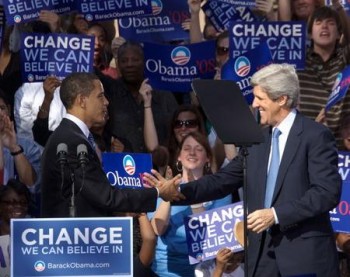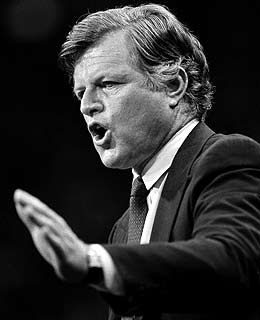September 8, 2009 – 12:16 am
OMG! No! No! No! How will I live? How will I feed my puppy, my parakeet, my pet rock? Not that I would elevate parochial interest above the greater good. Speechwriters are not a lobbyists, at least not until someone shouts fire us.
That said, I am closer to Vinca on this than to Matt. Despite what Matt recounts, the Bush White House had a bias to non-communication on key issues. Not that they saw it that way. But their insistence on over-the-top message control and for finding formulas they liked and sticking rigidly to them too often left the writers with little of substance to say and the president addressing too many events where he had no prospect of moving the debate. This was one reason they lost control of the Washington agenda early in the second term.
The Obama White House has a different problem. The president is a pleasure to listen to. The proliferation of web-based communications platforms just about calls for numerous appearances tailored to specific media. The president’s problem is not the frequency of his appearances but the substance of his message.
Look closely at the polls (I have been following Rasmussen with particular care). Since Inauguration Day, Mr. Obama has taken two drops in proportion of likely voters who strongly approve of him. The first came during the bailouts, take over of GM and multiple announcements of new trillion-dollar-plus spending. The second and more pronounced began when he started to lean into health care overhaul.
I am not going to get into my views of the health overhaul package or of the alternatives I see to it. I have done that at length numerous times elsewhere (most recently here: http://tiny.cc/fRznK). I will simply say that the White House’s problem is not its communication strategy but its policy strategy. Well before Wednesday night’s speech to the Joint Session of Congress, Mr. Obama had conveyed clearly and effectively the outlines of the health package he was seeking. The public heard, understood, and, at least to date, has said “no.”
If the president loses, it will be the third time an attempt to pass this model of health overhaul has failed in a little over half a century. The president and his allies should ask themselves if there is a message for them in these failures.
My advice? Send the president out all you want. Vinca is right. It would be helpful to be judicious about where you go and when. But most of all, make sure you have got the policy right.
September 7, 2009 – 9:17 pm
President Obama’s socialist indoctrination script for schoolchildren was unleashed released today (Labor Day – workers of the world, indeed) and he offers just enough to raise conservatives’ hackles:
You’ll need the knowledge and problem-solving skills you learn in science and math to cure diseases like cancer and AIDS, and to develop new energy technologies and protect our environment. You’ll need the insights and critical thinking skills you gain in history and social studies to fight poverty and homelessness, crime and discrimination, and make our nation more fair and more free.
While also saying just enough to appease conservatives:
[A]t the end of the day, the circumstances of your life – what you look like, where you come from, how much money you have, what you’ve got going on at home – that’s no excuse for neglecting your homework or having a bad attitude. That’s no excuse for talking back to your teacher, or cutting class, or dropping out of school. That’s no excuse for not trying.
These two sections actually capture the speech’s big themes: work hard, finish school, and make contributions to the world.
While there are a couple of self-serving moments (“I’m working hard to fix up your classrooms and get you the books, equipment and computers you need to learn”), the president mainly refers to himself in an effort to encourage kids who might feel a little out of step because of their family circumstances.
A few oddities stick out to me. For instance Read More »
September 7, 2009 – 9:53 am
I’d be interested to know what Ed and others think of Matt Latimer’s piece in yesterday’s Washington Post — “A Speechwriter’s Tip for Obama: Silence is Golden.” His overarching thesis, as others have argued as well, is that too much presidential airtime ultimately devalues the currency of the presidential word; that if Americans are seeing all talk from their president, all the time, they may lose their ability to distinguish the desperately important from the mildly interesting, and could respond by tuning out from Presidential pronouncements altogether.
So far so good. But Latimer’s solution?: “Fire the speechwriters.” And then, in what I’d consider speechwriterly overreach, he warns, “It might be the only way to save the presidency.”
Latimer compellingly describes the overloaded agenda the Bush administration’s speechwriters sometimes faced. He also explains why they were stuck with this problem:
Bush’s advisers, particularly Karl Rove, exerted enormous pressure on him to go out every day to talk about anything — even if no one was listening. Each year, for example, we were asked to produce three entirely separate statements to commemorate St. Patrick’s Day. And we crafted remarks for so many Hispanic-themed ceremonies that the president finally stood up in the Oval Office and told his speechwriters, “No más.”
Read More »
September 5, 2009 – 12:19 pm
Our friend Max Atkinson has begun a new series discussing his research of which techniques speakers use to arouse applause from their audiences.
He broke new ground in the mid 1980s after he analyzed dozens of famous politicians and identified various “claptraps.” A claptrap is a trick, device or language designed to catch applause.
He is celebrating the 25th anniversary of his documentary Claptrap by posting it on his blog and explaining how he arrived at his conclusions.
The first post is here. Scroll all the way down to the bottom of the post to see the videos. It is broken up into 4 parts. You can watch the first part here:
The second post is here and is where he begins to discuss the development of his work.
An excerpt:
The eureka moment came fairly quickly. I can’t remember exactly how many transcripts I’d done before noticing that the applause wasn’t just happening at random, but was occurring immediately after a small number of very simple verbal formats (e.g. contrasts, 3-part lists, etc.). But I do know that the main regularities had started to fall into place well before I’d got to the fiftieth example.
September 4, 2009 – 3:03 pm
 I don’t tend to agree with presidential spokesman Robert Gibbs, but I think he’s correct that criticism of President Obama’s plan to address the nation’s schoolchildren next week is “silly.”
I don’t tend to agree with presidential spokesman Robert Gibbs, but I think he’s correct that criticism of President Obama’s plan to address the nation’s schoolchildren next week is “silly.”
Conservatives should be careful where they tread on this issue. While skepticism of government intrusion is a conservative touchstone, so is respect for authority.
Not everyone treats presidents with respect. I know the National Education Association and the American Federation of Teachers probably would have staged a walk-out if George W. Bush had attempted to project himself into American classrooms. But conservatives pride themselves on being more level-headed than their opponents. This is a good moment to uphold that standard.
It’s the president’s responsibility not to use his forum as a launching point for political advocacy. If he violates that understanding, we can re-assess. But he deserves the benefit of the doubt.
The fact that the White House will publicly release President Obama’s remarks the day before the speech is actually a little depressing. This isn’t a PG-13 movie. If parents don’t trust the president not to fill their kids’ heads with lies, they need to think about how far they’ve let politics intrude into their lives.
September 2, 2009 – 4:20 pm
Finally heeding my advice*, President Obama is planning to get more explicit about what he wants out of health care reform during an address to Congress and the nation Wednesday night.
While much of the country may think, “Seriously? Again with the primetime?” the president could do himself some real good if he uses the forum to lay out a clear and easy to understand architecture of health reform.
Lately liberal commentators and other news analysts have come to the conclusion that the president’s vagueness on health care has devastated the cause. The White House won’t say that the president is going to serve up a fully fleshed out plan next week, but he should. The argument against an actual “Obama Plan” is that it gives the opposition something to rally around. Well that bird has sailed.
President Obama needs to be clear and direct about what he wants so that his supporters have something they can rally around.
Early word is that the president won’t make a public option a centerpiece of his rearticulated agenda. Good news if true, but it won’t make his base happy. He’ll have to put something in there that appeases people on the left who don’t think any good can come from for-profit medicine, and those on the right who don’t want to see a quasi-government insurance entity used to gain a toehold on socialized medicine.
This is a risky path in the sense that President Obama is putting his ability to lead to the test. But if his active intervention now leads to a health reform bill that is even in the ballpark of what he wants, his party and the media will be ready to give him credit — probably even more than he’s due.
Now it all hinges on the details.
* joke
August 31, 2009 – 10:05 pm
 Proving David Hannum right on the sucker born every minute front, check out this website for Bravina, a self-described “special blend of nine natural supplements” that “will help prepare you to execute an articulate public presentation.” For a mere $19.95, you too can have six tablet-sized amalgams of passiflora, motherwort, St. John’s wort, ashwagandha, Valerian root, Eleuthero root, panax, ginkgo biloba, and octacosanol — and the tantalizing prospect that in popping these pills you’ll find “the control and cognition you need to execute an articulate and effective public speech.”
Proving David Hannum right on the sucker born every minute front, check out this website for Bravina, a self-described “special blend of nine natural supplements” that “will help prepare you to execute an articulate public presentation.” For a mere $19.95, you too can have six tablet-sized amalgams of passiflora, motherwort, St. John’s wort, ashwagandha, Valerian root, Eleuthero root, panax, ginkgo biloba, and octacosanol — and the tantalizing prospect that in popping these pills you’ll find “the control and cognition you need to execute an articulate and effective public speech.”
Caveat Emptor.
August 31, 2009 – 1:32 pm
An excerpt of our friend Max Atkinson’s take on Joe Biden’s Ted Kennedy tribute:
Of the all the tributes to Edward Kennedy I’ve heard over the past couple of days, the one that stood out for me came from Vice-president Joe Biden.
A bit long, maybe, but there were moments of genuine sincerity that could perhaps only have been said by someone who’d lost a wife and child in a road accident and knew from his own experience the importance of support from friends and relations when you’re struggling to come to terms with such trauma.
Interestingly, two of the most quoted passages from Biden’s speech came from the following short sequence – one was a simple piece of imagery – “he was kind of like an anchor” – and the other a reasserted contrast “it was never about him. It was always about you. It was never about him.”
Read the rest here.
August 30, 2009 – 5:04 pm
 John Kerry is like an old toy you don’t think you like anymore, but then you pick it up after six months and you’re like, “Oh, yeah, I remember how fun this was!”
John Kerry is like an old toy you don’t think you like anymore, but then you pick it up after six months and you’re like, “Oh, yeah, I remember how fun this was!”
Case in point: Here’s John Kerry, talking to Time magazine this weekend about health care reform and what it means to be a legislator:
“Teddy would’ve probably found a way to have a vote, and if he’d lost the vote, he’d have moved on. That’s how you legislate. You don’t block. You don’t stop anybody from expressing their point of view. You’ve got to move on and then you live with the vote, I mean, that’s what Teddy would do.”
Here’s a New York Times story from 2006 about John Kerry working with his friend, Ted Kennedy, to block a vote on Sam Alito’s nomination to the Supreme Court:
Senator John Kerry of Massachusetts could not attend the Senate debate on the Supreme Court nomination of Judge Samuel A. Alito Jr. on Thursday. He was in Davos, Switzerland, mingling with international business and political leaders at the World Economic Forum.
But late Thursday afternoon, Mr. Kerry began calling fellow Democratic senators in a quixotic, last-minute effort for a filibuster to stop the nomination….
Mr. Kerry’s call for a filibuster, an effort to stop confirmation by refusing to close debate and hold a vote, was joined by his fellow Democratic senator from Massachusetts, Edward M. Kennedy.
Oh, John Kerry. You spoil us.
August 28, 2009 – 9:40 am
New Washington Post-ABC News poll today that is supposed to be good news for President Obama and congressional Democrats, but probably isn’t. The details:
Most Americans approve of the way President Obama is handling energy issues and support efforts by him and Democrats in Congress to overhaul energy policy — including the controversial cap-and-trade approach to limiting greenhouse gas emissions….
Even as public support has slipped for Obama’s health-care proposals, support for ambitious changes in energy policy has been steady.… Nearly six in 10 of those polled support the proposed changes to U.S. energy policy being developed by Congress and the administration. Fifty-five percent of Americans approve of the way Obama is handling the issue, compared with 30 percent who do not. A narrower majority, 52 to 43 percent, back a cap-and-trade system; that margin is unchanged since June.
Good news for the environmental agenda, eh? Well, not really. What’s the big difference between health care and environmental policy right now?
President Obama’s been talking about health care but not about the environment. So what this poll actually tells us is that President Obama’s golden tongue seems to drive down support for his most important initiatives.
Republicans should be hopeful on that count and another. Read More »
August 26, 2009 – 10:56 am
 Memories of Senator Ted Kennedy will be in many minds and hearts today and in the coming months. Here are links to two of Senator Kennedy’s more famous recent speeches: his endorsement of Barack Obama for president in the winter of 2008 and his rousing speech at least year’s Democratic convention.
Memories of Senator Ted Kennedy will be in many minds and hearts today and in the coming months. Here are links to two of Senator Kennedy’s more famous recent speeches: his endorsement of Barack Obama for president in the winter of 2008 and his rousing speech at least year’s Democratic convention.
Both speeches exemplify the passion and energy Kennedy brought to the podium every time he spoke. To reach such rhetorical heights even while battling a terrible illness is all the more remarkable.
And a third speech, perhaps Kennedy’s most well-known: speaking to delegates at the 1980 Democratic National Convention after losing his primary bid to unseat Jimmy Carter. (Unfortunately this is only transcript and audio — but his rhetorical flair still translates very well.)
Kennedy took heat for not going quietly into the night. But the closing lines of that speech will be oft-repeated as his legacy to his party and his country:
For all those whose cares have been our concern, the work goes on, the cause endures, the hope still lives, and the dream shall never die.
August 25, 2009 – 11:27 am
 It’s a tough time for financial services firms to hold their ground in favor of free market economics. Given their lack of popularity and their IV drip of government funds, most money companies don’t have any leeway to resist government overreach.
It’s a tough time for financial services firms to hold their ground in favor of free market economics. Given their lack of popularity and their IV drip of government funds, most money companies don’t have any leeway to resist government overreach.
Which is why it’s refreshing to see Chuck Schwab make a run at America’s top legal bully, New York Attorney General Andrew Cuomo. Cuomo is following Eliot Spitzer’s path to the New York governor’s office: arm-twisting big name, deep pocketed financial companies into settlements under threat of litigation. What Spitzer trailblazed, Cuomo has perfected in the age of Wall Street ignominy.
But Schwab isn’t playing ball. Rather than settle with Cuomo’s office over the issue of whether brokers should be responsible for their customers’ purchases of Auction Rate Securities, Schwab is letting Cuomo take his company to court. And he’s battling Cuomo’s media preening with a public strategy of his own.
Late last week Schwab penned an op-ed in the Wall Street Journal that laid out the case for why Cuomo’s vision of financial regulation is inimical to the proper functioning of the market and to the basic American understanding of risk and reward: Read More »
August 24, 2009 – 11:07 am
The Republican Party is out today with a new Seniors’ Health Care Bill of Rights. As described by party chairman Michael Steele in the Washington Post, the guarantees include:
- Protecting, not cutting, Medicare;
- Prohibiting government from getting between seniors and their doctors;
- Outlawing any effort to ration health care based on age;
- Preventing government from dictating the terms of end-of-life care;
- Preserving Tricare, the veterans health care program.
The plan echoes the old Contract with America of 1994. In fact, Steele refers to the Health Care Bill of Rights as “the Republican Party’s contract with seniors.”
The benefit of such a straight-forward approach is that it makes for good messaging. Not only does it boil down complicated policy questions into easily understandable talking points, it also offers a litmus test for future government action – sort of a money-back guarantee, which everyone loves and few people ever enforce.
Targeting seniors is also a smart move, since elderly people are prone to both get upset about things and vote.
Traditionally, seniors don’t trust Republicans with their government health care. The Medicare prescription drug benefit passed in 2003 hasn’t done a whole lot to change that. If Republicans can make inroads on a social safety net issue like Medicare, GOP congressional candidates could benefit in 2010.
On the downside, the contract does dip Republican toes into the pool of Medicare demagoguery. Everyone knows Medicare will have to be cut sometime, by someone. But that’s an issue to worry about when you’re governing, not when you’re in the opposition.
August 21, 2009 – 10:40 am
Earlier this summer, Ed, Jeff, Clark, and I had the pleasure of lunching with the editors of Politics magazine. Check out highlights of our conversation in the current issue, here, including war stories from the Reagan, Clinton, and Bush administrations; views on the rise of the celebrity speechwriter; and perspectives on the changes we’ve seen over the course of our speechwriting careers.

 I don’t tend to agree with
I don’t tend to agree with  Apparently teens and twenty-somethings these days aren’t very good at face-to-face interaction.
Apparently teens and twenty-somethings these days aren’t very good at face-to-face interaction.  Proving
Proving  John Kerry is like an old toy you don’t think you like anymore, but then you pick it up after six months and you’re like, “Oh, yeah, I remember how fun this was!”
John Kerry is like an old toy you don’t think you like anymore, but then you pick it up after six months and you’re like, “Oh, yeah, I remember how fun this was!” Memories of Senator Ted Kennedy will be in many minds and hearts today and in the coming months. Here are links to two of Senator Kennedy’s more famous recent speeches: his
Memories of Senator Ted Kennedy will be in many minds and hearts today and in the coming months. Here are links to two of Senator Kennedy’s more famous recent speeches: his  It’s a tough time for financial services firms to hold their ground in favor of free market economics. Given their lack of popularity and their IV drip of government funds, most money companies don’t have any leeway to resist government overreach.
It’s a tough time for financial services firms to hold their ground in favor of free market economics. Given their lack of popularity and their IV drip of government funds, most money companies don’t have any leeway to resist government overreach.